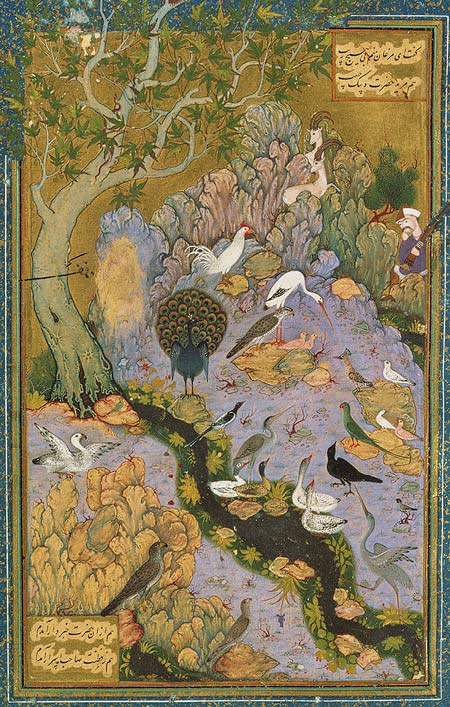From a comment I made on a friend's journal, wherein we were talkin' religion, and she asked about having heard a reference to a Green Man and Sufis:
"Al-Khidr or Al-Khizr, the Green One.Al-Khidr is a Qur'anic figure (Sura 18:66-18:88 -- yep, just checked it; he is referred to not by name, but as "one of Our servants to whom We have vouchsafed Our mercy and whom We had endowed with knowledge of Our own" when he meets up with Moses. He does things that seem highly arbitrary and violent to Moses, while commanding Moses to stop questioning him, then when they are fixing to separate, he explains the reasons behind why he did what he did) and when I say figure, it's because his position is unclear: saint, prophet, undefined servant of God.
There are many things not known about Al-Khizr, but there is no doubt he is an instrument of God. One thing that is known is that he has the ability to suddenly help those chosen to receive it with insight and realization, sometimes rather painful. There are customary du'as where you can ask for help/intercession/guidance through Al-Khizr, but they are never to be used lightly.
Some have said he is associated with the Green Men of Europe, and is basically a pagan figure made Islamic.
I'd say tread *very* lightly on that notion, though. Similar ideas may abound because there is an essential truth with a different interpretation, but Al-Khizr should not be considered pagan or entirely analogous to a Green Man...and it gets into some pretty gray areas to incorporate Islamic beliefs into anything polytheistic :).
Oh! Also: green is the color of Islam. It was the color most favored by the Prophet Muhammed (pbuh), and in hadith, he said: "Three things of this world delight the heart [are worthy of the gaze]: water, green things, and a beautiful face." :)"
So other than checking the Qur'anic reference, this was an off-the-cuff answer, and may be riddled with half-accuracies. For more on Al-Khidr, there are many sources. One such page is here.
Al-Khidr fascinates non-Muslims as well as Muslims, in part because he is so enigmatic, and yes, there is a sense of wildness, unpredictability, and a kind of elemental nature that maybe does equate him with the European Green Man. I don't really like to speak in terms of archetype, because doing so makes something/someone of infinite complexity and truth into something that is pat and unformed. I think such parallels -- which again, are NOT complete -- indicate something true conducted as light through different cultural prisms. After all, the Prophet (pbuh) himself said that there were prophets sent to all the peoples on earth; each prophet, while a vessel of the Divine, is also a human product of his or her own culture, so the construct of the message he or she brings is going to be delineated by that culture. I don't know how else to put it. Does that make any sense to y'all? (I'm tired, but I still felt compelled to write this).
Y'all can see why Al-Khidr is not spoken of or to lightly. The issue of asking Al-Khidr to intercede or give guidance, and the issue really of saints (wali) in Islam is somewhat controversial. Intercession (tawassul) is a controversial matter, with those of more conservative Sunni bent seeing it as shirk. Shi'ites put firm boundaries on it, as I understand, as do that majority of Sunnis. Sufis? Well, we just love our walis, yes we do.
Recall, Islam is no monolith in belief or in custom, even if we all pray using the same words and at the same time and facing the same direction.
Another site on Islam:
http://www.livingislam.org/index.html
This one will take me quite a while to explore, it's so dense. I am not sure, if you're looking for basic info, that this is your best bet. The stance seems to be more conservative on the whole, although it's evident the maintainers don't much care for Salafis (Wahhabis), which really, I'm not that big on Salafis, either, since I consider it misguided and reactionary (and heaven knows, MY opinion on these matter counts for so much, but I like to make my stance clear). But for deeper readings of texts, it looks very useful, and the articles cover a wide range of things. I'll be foodling around on this one for a while.
Monday, January 11, 2010
Subscribe to:
Posts (Atom)

